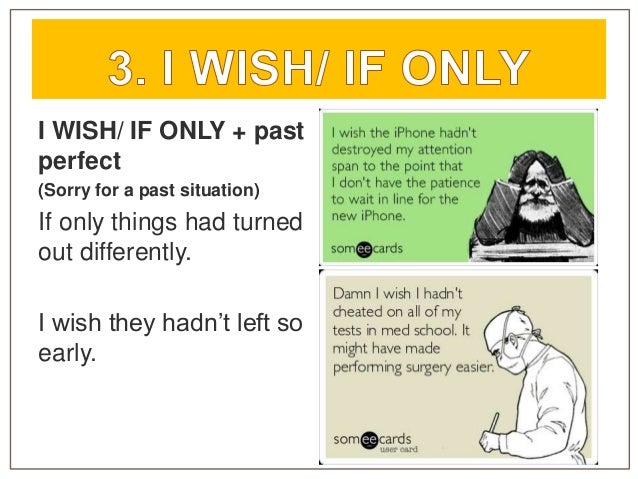Wish and if only for regrets
Wish and if only for regrets

Wish and If only
Wish and ‘If only’ are both used to talk about regrets – things that we would like to change either about the past or the present.
Talking about the present
Talking about the present
- If only I didn’t have so much homework I could go to the concert tonight. She has a lot of homework and she can’t go to the concert.
- I wish you didn’t live so far away.
- I wish I knew what to do.
When we talk about present regrets, both wish and if only are followed by the past simple tense. The past tense emphasises that we are talking about something ‘unreal’.
Talking about the past
Talking about the past
- I wish I’d studied harder when I was at school. He didn’t study harder when he was at school.
- I wish I hadn’t eaten all that chocolate. I feel sick.
- If only I’d known you were coming.
Both wish and if only are followed by the past perfect tense when we talk about past regrets.
Wish/if only and would
We use wish + would to talk about something in the present that we would like to change – usually something that we find annoying.
Wish/if only and would
We use wish + would to talk about something in the present that we would like to change – usually something that we find annoying.
- I wish you wouldn’t borrow my clothes without asking.
- I wish it would rain. The garden really needs some water.
- I wish you’d give up smoking. it’s really bad for you.
NB We can only use wish + would to talk about things we can’t change.
SoI wish I wouldn’t eat so much chocolate is not possible although we can say I wish I didn’t eat so much chocolate.
So
I wish, If only.
Wishes about the present
We use wish with past Tense forms (simple and continuous) to express regret about present situations:
- I wish I was taller = (I’m not very tall)
- I wish I was going with you = (but I'm not)
I wish you were more help. = (you are not) I wish I were can replace I wish I was.
To many people, I wish I were sounds more correct:
I wish I were taller.
We use wish with could to express a wish for a present situation to be different:
I wish I could use a computer well.
X I wish I would tell her about it.
I wish I could tell her about it.
Past Simple > present>I wish I knew the answer. (= I don’t know)
Past Simple > present > I wish I was /were better at sports. (= I'm not)
Past Continuous > present > I wish I was /were going with you. (= I'm not)
Could > present > I wish I could give you an answer. (= I can't)
Would > future > I wish you would be quiet. (= Your talking irritates me.)
Past Perfect > past > I wish I had known you then. (= but I didn't)
Could have > past> I wish I could have explained. (= I wasn't able to)
Wishes about the future
We use wish with would to say how we would like somebody to behave in the future:
/I wish you would stop talking.
/I wish they would stop arguing.
• We can also use this pattern in situations that do not involve people:
I wish this car would go faster.
Wishes about the past
We use wish with the Past Perfect when we have
Regrets about the past:
I wish I hadn't taken your advice. (= but I did)
I wish she could have come. (= but she didn't)
If only
If only can be more emphatic than I wish. The verb forms after if only are the same as the patterns with wish:
If only I had more money! (= but I haven't)
If only I was going on holiday with you!
If only you were here. (= but you re not)
If only the sun would come out!
If only you could be here! (= but you're not)
If only I'd listened to you! (=but I didn't )
If only he could have explained! (=but he wasn't able to)
Comentarios
Publicar un comentario